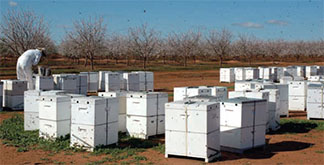

150,000 hives set to arrive in north-west Victoria in coming weeks for the almond pollination season
Beekeepers who plan to attend pollinations are urged to complete a four point checklist.
Agriculture Victoria is preparing for the annual almond pollination season with an estimated 150,000 hives set to arrive in north-west Victoria in coming weeks.
Agriculture Victoria Senior Apiary Officer, Joe Riordan, said such a large movement of bee hives increases biosecurity risks associated with hive to hive transmission of bee pests and diseases, most notably American foulbrood disease.
“American foulbrood can spread from an infected hive whether it be weakened or already dead, known as ‘dead outs’, by robber bees who take the infected honey back to their healthy hive,” he said.
Mr Riordan said he wanted to remind beekeepers who are planning to attend pollination that they should complete a four point checklist before leaving their premises.
“It doesn’t matter if they come from Victoria, South Australia, New South Wales or Queensland, all beekeepers need to ask themselves, have they:
“Undertaking the activities on the checklist will support Agriculture Victoria efforts to ensure best practice management of hives as required by the Australian Bee Industry Biosecurity Code of Practice.”
Learn more about honey bees.
Acknowledgement: Reproduced from a media release from Agriculture Victoria